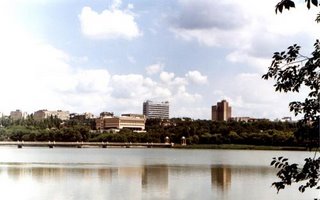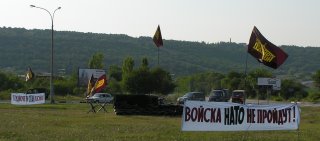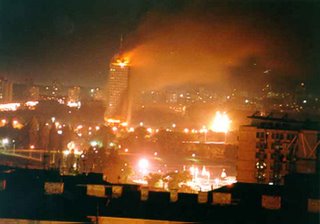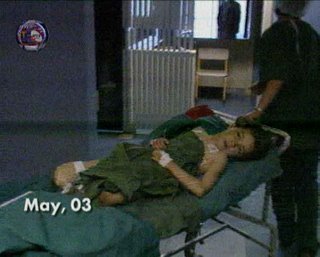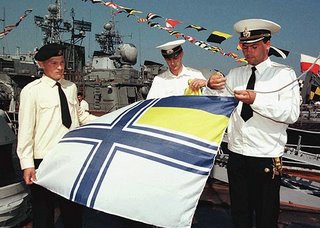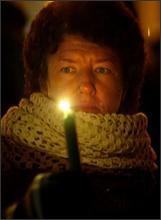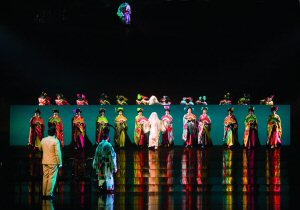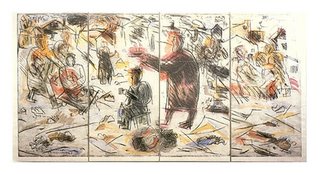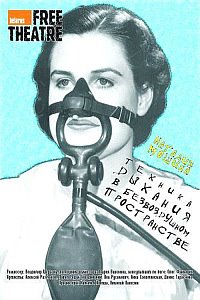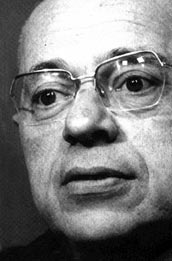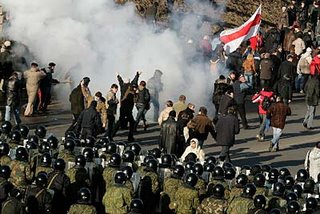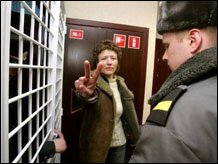 Last Dictatorship Of Europe: 500 Prisoners of Conscience
Last Dictatorship Of Europe: 500 Prisoners of ConscienceMarch 28, 2006 20:43
"According to the last information of the human rights activists, 480 Belarusians were accused for taking part in peaceful protests against fraudulent elections results. One cannot be sure that it’s a complete list. The human rights organizations are still receiving phone calls from people who cannot find their children went missing on March 24 in the night when the tent camp was disbanded. There is no exact information still, where the people were taken to serve sentences. Some people were found by relatives in the detention center in Akrestsin Street, some in remand prison in Valadarski Street, and some in the detention center in Zhodzina. Prisoners of conscience in Zhodzina remand prison have announced a hunger strike of protest against unjust verdicts. The administration refuses to give information about the state of health of prisoners."
Charter 97 offers an updated list of prisoners, prepared by the human rights center “Viasna”:
1. Abrazcow Z`micer - 15 days
2. Abramenka Mikita court of Partyzanski district, judge Pykina -- 10 days
3. Agarow Anton -- 10 days (Partyzaski district court)
4. Adamovich Pjotr -- 10 days
5. Adzincow Andrjej -- 7 days, court of Zavodski district
6. Aksenevich Jury - court unknown
7. Alejnik court of Savetski district
8. Al`shjewski - 7 days, court of Savetski district
9. Aljab`ew Aljaksandr court of Partyzanski district,
10. Andrusik Larysa - fined 10 basic units, court of Savetski district
11. Anjankow Sjargej - 10 days court of Tsentralny district
12. Arlow Bagdan -- 10 days
13. Arlow Viktar - 15 days court of Tsentralny district
14. Arcimenka Kanstancin
15. Arjehaw Andrjej -10 days court of Tsentralny district
16. Arjeshka Dzjanis (Pershamajski district court)
17. Asipenka Aljaksej - 10 (?) days court of Tsentralny district
18. Awdzejchyk -- 10 days
19. Afnagel` Jawgen -- 5 days Partyzanski court
20. Ahmadzieva Julija - 7 days, Kastrychnicki district court, judge Germanovich
21. Babich Nadzeja - 4 days, court of Partyzanski district
22. Bagdanaw Stanislaw - 10 days, court of Pershamajski district
23. Bagucki - 10 days courtPershamajskaga rajonu
24. Bakur Jury
25. Balonkina Julja - 15 days, judgePratasavickaja, court of Kastrychnitski district
26. Baranaw Andrjej --10 days
27. Baranchuk O.V., 1987
28. Baranchuk Tacjana
29. Barok Andrjej -? court of Pershamajski district
30. Barstok Sjargej - 10 days, court of Savetski district
31. Barysevich - 5 days, judgeAnanich, court of Pershamajski district
32. Bas Jawgen - 15 days, court of Savetski district
33. Batalaw Mikita - 10 days, judgeMakuha , court of Pershamajski district
34. Batuew Pavel -- 10 days
35. Batura Nadzeja - 5 days ( court of Zavodski district)
36. Bajaryn Natal`lja - fined 50 basic units, court of Pershamajski district
37. Bezmaternyh И.A., 1987
38. Bezmacernyh Kacjaryna - 4 days, court of Partyzanski district, judge Awdzejchyk
39. Benedyktaw Іvan -- 5 days
40. Berkoj - 10 days, court of Savetski district
41. Bernikovich Jaraslaw -- 7 days
42. Bil`dzjuk Aljaksej court of Pershamajski district
43. Bolonkиna Ju.V., 1986
44. Brokaraw Jeduard - 10 days, court unknown
45. Brjetko - 10 days of Maskouski district
46. Budaj -- 5 days
47. Buzhelenko L.V., 1966
48. Bujnicki Dzjanis
49. Bujnicki Maksim court of Pershamajski district
50. Burak Іna
51. Burak Іryna - 7 days, Kastrychnicki district court, judge Germanovich
52. Burakow Ales`
53. Bursevich Nasta - 5 days, judge Ananich, court of Pershamajski district
54. Buhamenka Larysa - 15 days, judge Pratasavickaja, court of Kastrychnitski district
55. Bjalevich Sjargej
56. Bjal`ko (Cjentral`ny district court)
57. Vajnilovich Mikalaj c court unknown
58. Valkavec Jawgen
59. Vanina Tacjana - 10 days, court unknown
60. Vanchuk Aljaksandr -- 10 days
61. Vasilewski Ales` - 10 days, judge Aniskevich,
62. Vasil`kavak
63. Vawkavec Jawgen -- 7 days
64. Vashkevich Dzjanis --15 days
65. Vashkevich Maryna - 7 days, Kastrychnicki district court, judge Germanovich
66. Vensko Dz`mitry
67. Verab"jow Sjargej - 7 days, judgeAniskevich court of Pershamajski district
68. Vitkowskaja E. - 7 days, Kastrychnicki district court, judge Germanovich
69. Vitkowskaja Tacjana - fined 30 basic units, court of Kastrychnitski district
70. Vishnewski Valery - 10 days, court of Pershamajski district
71. Volchek И.A., 1984
72. Vsevnik
73. Vjarowski -- Pershamajski district court
74. Gabryel`chyk Іna - 7 days court of Partyzanski district
75. Gabanidze Nino -reporter, 10 days (?), court of Savetski district
76. Gavaka Viktar --10 days
77. Gazimaw Cimur - 10 days, judge Makuha court of Pershamajski district
78. Gajduk T. - court of Partyzanski district, judge Barysjonak
79. Gajduk Julijan -- 7 days (art 156, KaAP)
80. Galinowski Z`micer
81. Gamolka Z`micer - 10 days court of Pershamajski district
82. Garadzinski Aljaksej
83. Garanjuk
84. Garachka Z`micer - 10 days, judgeMakuh, court of Pershamajski district
85. Gardzeew Mikalaj - 7 days, court of Pershamajski district
86. Garjelik Sjargej - 10 days (in Zhodzina, on hunger strike) court of Pershamajski district
87. Germak Maryna - 5 days, court of Pershamajski district
88. Gizun Ales` (167-1) Savecki district court
89. Gizun Zhana - 10 days, court Pershamajskaga rajonu
90. Glezin Jeduard - court of Leninski district
91. Grablewski Aleg -- 10 days, court of Partyzanski district
92. Gran` -- 10 days, court of Partyzanski district, judge Trubnikaw
93. Grubich Aleg
94. Grudz`ko - court of Leninski district
95. Grudz`ko Tacjana - 3 days, court Pershamajskaga rajonu
96. Grynchyk Viktar - 12 days, court Pershamajskaga rajonu
97. Gryckevich Galina - 10 days, court of Maskouski district
98. Gryshan Tacjana - court of Leninski district
99. Gryshkevich Viktar - 5 days, court of Savetski district, judge Kazadaew
100. Gudzilin Sjarzhuk - 15 days
101. Gusakova Stanislava - 12 days, court of Leninski district
102. Davidovich Vasil` -- 15 days
103. Daragawcaw Aljaksandr
104. Darafeeva Anastasija - court of Leninski district, 10 days
105. Dashkevich Z`micer -- 15 days
106. Dzegcjarow A. Ja. court of Partyzanski district, judge Awdzejchyk
107. Dzemidovich E. - court of Leninski district
108. Dzemidovich Jawgen
109. Dzemchonak Natal`lja
110. Dzeshkevich - court of Leninski district
111. Dzivina Maryja - court of Leninski district, 10 days
112. Dzishchyc Aljaksandr - court of Leninski district
113. Dz`jachkow Aleg - court of Leninski district
114. Dz`jachjek Іna A. - 15 days, judge Pratasavickaja, court of Kastrychnitski district
115. Dzjadok T. - 10 days, judge Pratasavickaja, court of Kastrychnitski district
116. Dzjanisava Palina -- 10 days
117. Dzjanisaw Dzjanis - 10 days, court of Leninski district
118. Dubovik -- 10 days
119. Dubowski M. - court of Leninski district
120. Dulub N. court of Partyzanski district, judge Trubnikaw
121. Dyzun Aljaksandr – tried by Saveckim district court
122. Djepryz Aljaksandr (Partyzanski district court)
123. Eewnik Viktar
124. Jolkina Ksenija (underage, released)
125. Ewdakimava L. A - 10 days, judge Pratasavickaja court of Kastrychnitski district
126. Ewcihiew - court of Partyzanski district, judge Barysjonak -- 5 days
127. Zhalezka Kacja
128. Zhloba S
129. Zhuk S. A - court of Leninski district
130. Zhukaw A. A. - court of Leninski district
131. Zhyz`newskaja Alena - 7 days, Kastrychnicki district court, judge Germanovich
132. Zhalinskaja E. - court of Partyzanski district, judge Barysjonak
133. Zhalinskaja Svjatlana - 7 days, Kastrychnicki district court, judge Germanovich
134. Zhyh Dz`mitry - 10 days, court of Leninski district
135. Zavadskaja Іryna - 10 days, judge Pratasavickaja court of Kastrychnitski district
136. Zavacki D. І.- court of Leninski district
137. Zaves`nicki Jawgen -- 5 days, Zavodski district court
138. Zajcaw -- 7 days (Zavodski district court)
139. Zalatar Aljaksandr
140. Zalesski Mikita - 15 days, court of Leninski district
141. Zemchanka Natal`lja
142. Zemchonak M. - court of Leninski district
143. Znak Maksim - 13 days, court of Tsentralny district
144. Zolataw Cihan
145. Zoryn Uladzimir - court of Leninski district
146. Zubok Aljaksej V. - 15 days, court of Leninski district
147. Zuew Andrjej - court of Leninski district
148. Z`verava - 10 days, court of Savetski district
149. Z`veraw Dz`mitry (?) court of Savetski district
150. Zjukaw Dzjanis, court of Pershamajski district
151. Zjalinsaja Dar’ja - 8 days court of Leninski district
152. Zjamchonak Natal`lja - 10 days
153. Иvanova E.A., 1987
154. Іvankow - 10 days, court of Savetski district
155. Іvanova Іna
156. Іvanjuk Jawgen
157. Іvashkow - 10, judge Silicki Sjargej, court of Savetski district
158. Іgnac`eva Alena (underage, released)
159. Іl`kevich Aleksandr - 10 days, court of Leninski district, judge Bortnik
160. Іl`kevich Sjargej -- 10 days
161. Іl`lin Mikola
162. Іnazemcaw Danila
163. Kavaljonak Vital` --10 days
164. Kavaljonak Mikola
165. Kavalewskaja Nadzeja - 7 days, Kastrychnicki district court, judge Germanovich,
166. Kaval`chuk Artur - 15 days
167. Kazak V. A. - court of Leninski district
168. Kazak E. - court of Partyzanski district, judge Barysjonak
169. Kazakow Maksim - 15 days
170. Kazlova Natal`lja
171. Kazlow Jawgen -15 days, court of Savetski district, judge Barazna Sjargej
172. Kazlowski Aleg (“Pravoe delo”, Russia), 15 days of arrest, on March 27, by unknown court
173. Kazlowski Aljaksej - 10 days. court of Savetski district
174. Kazlowski Z`micer
175. Kaznachjeew Vadzim - court of Leninski district- 10 days
176. Kazulin Aljaksandr Uladzimiravich (nephew of the candidate for presidency) -- court of Partyzanski district, judge Awdzejchyk -- 7 days
177. Kazulin Aljaksej (nephew of the candidate for presidency) -- 10 days
178. Kalejchyk Z`micer - 7 days, court of Savetski district
179. Kalinin V. - court of Leninski district
180. Kanapljow Arseni - 3 days court of Savetski district
181. Kandrusevich Uladzimir -- court of Savetski district– verdict unknown
182. Karaljonak Mikola - 15 days
183. Karal`chuk Aljaksej
184. Karbanovich Sergej -10 days (Pershamajski district court)
185. Karbinski Vital`
186. Karnow Dzjanis - 7 days
187. Karol` Dzjanis - 10 days court of Savetski district, judge Tarchylina, Larysa
188. Karona Jawgenija (underage, released)
189. Karshuk Anastasija - 7 days, Kastrychnicki district court, judge Germanovich
190. Kastjenka Dar"ja - 10 days, judge Pratasavickaja, court of Kastrychnitski district
191. Kascjuk Ganna - 15 days, court of Savetski district
192. Kas`cjuk Tac`cjana
193. Kas`cjuchjenka Anatol` - 15 days, court of Savetski district
194. Kachanaw - court of Leninski district
195. Kachanaw Andrjej
196. Kachjewski (Cjentral`ny district court)
197. Kashjel` Aljaksej - 15 days, court of Savetski district
198. Kirjeew Viktar - court of Leninski district
199. Klecawka Kacjaryna- court of Leninski district
200. Klimutko Іna
201. Kogaj Ganna - 10 days, court of Savetski district
202. Kopel Andrjej
203. Konash Aljaksandr
204. Konash Aljaksej – (167-1) Savecki court, 10 days
205. Kopac` Ales` -- 7 days
206. Korzh Maksim - 10 days
207. Korsak Vol`ga - 7 days, judge Germanovich, court of Kastrychnitski district
208. Korshun A.E., 1988
209. Korash Vol`ga - 5 days court of Savetski district
210. Koshal` Aljaksej -- 15 days court of Savetski district, judge Savosc`jan Ljudmila)
Krasnow Mikita - 12 days court of Frunzenski district
211. Krasucki Sjargej
212. Krasjachkow Vital`
213. Krawchonak Aljaksandr -- 5 days, Zavodski district court
214. Kruchok Ksenija -- 7 days
215. Krushjewski - 15 days court of Frunzenski district
216. Kryvanosava Vol`ga - 4 days, court of Partyzanski district, judge Awdzejchyk
217. Kryvanosava Natal`ja - 4 days, court of Partyzanski district, judge Awdzejchyk
218. Ksjandzow Kiryl - 15 days, court of Frunzenski district
219. Kuvaev Aleksej
220. Kudzelik E.A. - 10 days, court of Maskouski district
221. Kudzjanava Jawgenija
222. Kuzhaleva (?) court of Savetski district
223. Kuz`njacow Z`micer
224. Kuklevich Vital` - 15 days, court of Frunzenski district
225. Kulej Іgar - 15 days, court of Frunzenski district
226. Kunich Z`micer
227. Kupchanka Vera
228. Kurcow Gleb -- 10 days
229. Kurylovich Palina (underage, released)
230. Kur`janova E.S., 1985
231. Kuwshynaw Aljaksandr
232. Kuwshynnaja Tacjana - 15 days, judge Pratasavickaja, court of Kastrychnitski district
233. Kuchynski --10 days
234. Labanow Jawgen - 10 days, court of Frunzenski district
235. Lavinskaja Tacjana
236. Lavrenovиch Ja.T., 1985
237. Lavua Frjedjeryk (Canadian citizen, reporter) -- 15 days
238. Lagidze Georgi, journalist - 15 days, court of Savetski district
239. Lantuh Aljaksandr (Savecki district court)
240. Lapcjonak Z`micer - 15 days, court of Frunzenski district
241. Laryna Anastasija - 7 days, court of Maskouski district
242. Laryna Tacjana - fined 20 basic units, court of Frunzenski district
243. Lawrynovich Jana - 10 days, judge Pratasavickaja court of Kastrychnitski district
244. Lacinski - 10 days court of Frunzenski district
245. Lashuk Aljaksej -- 13 days, Pershamajski district court
246. Levadovich Vasil` -- 15 days
247. Leonava S`vjatlana - 4 days, court of Partyzanski district
248. Leshchow, court of Partyzanski district, judge Lebedz` -- 10 days
249. Lisicyn Sjargej - 10 days, court of Partyzanski district
250. Liskevich Jawgen - 10 days, court of Frunzenski district
251. Listahaw Dz`mitry - 10 days (167-1) Savecki district court
252. Litvinaw Mihail - 10 days, court of Partyzanski district
253. Lukin Pavel - 10 days, court of Frunzenski district
254. Luk"janchyk Arcjom - 15 days court of Frunzenski district
255. Lysjuk -- 10 days, court of Partyzanski district, judgeTrubnikaw
256. Ljava Arcjom -- 15 days (Frunzenski district court)
257. Ljavonava S`vjatlana
258. Ljashchow Anton -- 10 days
259. Mazur Ales` -- 7 days
260. Mazuchjenka - court of Frunzenski district
261. Malashchyckaja V. V. - 15 days, judge Pratasavickaja, court of Kastrychnitski district
262. Malodkina Anastasija - 10 days, judge Shyl`ko, court of Maskouski district
263. Malyщиckaja V.V., 1960
264. Mancjevich - 10 days, court of Frunzenski district
265. Mancjevich Nadzeja
266. Marchyk Sjarzhuk
267. Maskevich Veranika - 10 days, court of Frunzenski district
268. Mackojc` Sjargej
269. Macuk Dz`mitryj -- 10 days
270. Mac`veew Ruslan (underage, released)
271. Macjuhin Aljakandr - fined 20 basic units, court of Frunzenski district
272. Mashkevich Maryjush -15 days, court of Leninski district
273. Mikul`chyk Aljaksej - 13 days, court of Frunzenski district
274. Misjuk -- 10 days ( court of Partyzanski district)
275. Mitrafanaw Aljaksej - court of Frunzenski district
276. Mihijonak Sjargej - 10 days, judge Ljudmila Lappo, court of Frunzenski district
277. Murabava - A. court of Partyzanski district, judge Pykina
278. Murashka Sjargej -- 7 days
279. Murydova D.L., 1987
280. Navumenka Jaraslaw - 15 days, court of Frunzenski district
281. Narjel` Natal`lja
282. Naskow Mihail - 15 days, court of Frunzenski district
283. Netkachow Jawgen - 15 days, court of Frunzenski district
284. Nikalajchuk V. - 10 days, court of Maskouski district
285. Nihimaw - trial postponed, asked for a lawyer, court of Maskouski district
286. Novik Zh. A - court of Partyzanski district, judge Trubnikaw
287. Novikaw Alyaksej
288. Nytkina Vol`ga - 7 days, Kastrychnicki district court, judge Germanovich
289. Njadbaeva Tac`cjana
290. Padalinski Іgar -- 15 days (Frunzenski court)
291. Padrabinjek Aljaksandr (reporter, Russia) - 15 days, court of Savetski district, judge Kazadaew
292. Pazhygan Aljaksandar
293. Palevikova Valjancina - 15 days, judgePratasavickaja, court of Kastrychnitski district
294. Palojka Z`micer (Baranavichy) - (kept in Zhodzina until the trial)
295. Pankavec Viktar court of Zavodski district
296. Parshyn Іvan -- 10 days
297. Pawlenka Aljaksandr, detained on March 25
298. Pawlenka Dz`mitry -- 15 days (Savecki court, 167-1)
299. Pawlenka Tacjana, deatined on March 25, -15 days
300. Pawlenka Aljaksandr - 10 days
301. Pawroz Mikita - 10 days, court of Tsentralny district
302. Pahuchy Jury -- 5 days
303. Pachobut Stas - 10 days, court of Tsentralny district
304. Pashynok (Cjentral`ny district court)
305. Pashytok -- 10 days (Zavodski district court)
306. Peljapat Alena -- 7 days (court of Zavodski district)
307. Peralygin -- 10 days
308. Pilac` Mihail -- 15 days
309. Piljaeva Masha
310. Pinchuk Viktar - 15 days, court of Savetski district
311. Pirjejka Aljaksandr - 10 days court of Tsentralny district
312. Pisarchyk Sjargej - 10 days court
313. Plaksicki Aljaksandr -- 3 days
314. Platonaw Arcjom (underage, released)
315. Palevikova Valjancina - 15 days
316. Porah Aljaksandr - 10 days, court of Tsentralny district
317. Prakacen`
318. Pratasaw - 10 days, court of Savetski district
319. Proharaw Pavel - 5 days court of Partyzanski district
320. Pryshnewski court of Tsentralny district
321. Pugach Dzjanis court of Tsentralny district
322. Pulynka
323. Pjachjerskih Jury - 10 days court of Tsentralny district
324. Rabykin Kiryl -- 5 days
325. Ravucki Uladyslaw
326. Ragachow Z`micer - 15 days, advez`li w Zhodzina court of Tsentralny district
327. Ragowski (?) - court of Savetski district
328. Radyno Alena court of Partyzanski district, judgeTrubnikaw
329. Rakovich Aljaksej - 10 days
330. Ramanovich Aljaksandr - 10 days court of Tsentralny district
331. Ramanowski Cjargej - 15 days court of Tsentralny district
332. Ramancow Uladzimir
333. Rasol`ka Kiryl (Partyzanski district court)
334. Rahmanaw
335. Rapeka - 10 days Of Partyzanski district, judgeTrubnikaw
336. Rugajny Vital`
337. Rudzjankow Garry Aljaksandravich (born 1935. In Zhodzina, trial on Monday in Tsentralny district court of Minsk
338. Rudovich Aksana - 7 days, Kastrychnicki district court, judge Germanovich
339. Rudjenkow Rygor - 5 days court of Tsentralny district
340. Rusanaw Іgar
341. Rjevucki Wladzislaw court of Tsentralny district
342. Rjez`nikaw --10 days
343. Savicki Pavel --10 days
344. Savchenkova E.V., 1986
345. Sadawnichy Іl`lja - 15 days court of Tsentralny district
346. Sadowski І
347. Sakalowski (?) court of Zavodski district
348. Salavej Іgar -- 10 days ( court of Partyzanski district, judgeAwdzejchyk)
349. Salaman - 10 days court of Tsentralny district
350. Salawew Z`micer (Magiljow) - 10 days
351. Salodki - 5 days court of Zavodski district
352. Salygo P. - court of Leninski district
353. Samalinska Veranika (Gazeta Wyborcza, Poland) 10 days, since March 27, court of Leninski district
354. Samal` - court of Tsentralny district
355. Santarovich Andrjej , court of Pershamajski district
356. Sasnowski Anton - 7 days court of Partyzanski district
357. Sawchankava Valeryja - 7 days, Kastrychnicki district court, judge Germanovich
358. Saharchuk V. - 7 days, Kastrychnicki district court, judge Germanovich
359. Svidzerski S`cjapan
360. Svirydovich Anton -- court of Savetski district-- 12 days
361. Sevjaryna Tacjana - 4 days, court Partyzanski, judge Pykina
362. Semenchyk Maksim - 10 days, court unknown
363. Semchonak Natal`lja
364. Senchanka Aksana -- 15 days
365. Senchanka Aljaksandr - 15 days
366. Sen`ko Valera
367. Sen`ko Viktar - 7 days (Akrjes`cina)
368. Sergienka Aksana
369. Sechko Natal`lja -- 7 days, placed to Zhodzina
370. Silkova V.V., 1954
371. Sivanovich Jawgen - 8 days, court of Zavodski district
372. Sidarjevich Ala - 10 days court of Zavodski district
373. Sidarovich Andrjej court of Tsentralny district
374. Silkova Vera - 10 days, judge Pratasavickaja court of Kastrychnitski district
375. Sinkevich Aljaksandr -- 10 days
376. Sinkevich Nadzeja - 7 days court of Zavodski district
377. Sinichyn Dzjanis - 15 days
378. Sin`kevich Pavel - 10 days
379. Sichko court of Tsentralny district
380. Skarabagaty Arcjom - 5 days court of Zavodski district
381. Skarabagaty Leanid - 15 days court of Zavodski district
382. Smok Vadzim
383. Snytkina Vol`ga
384. Soltan - court of Savetski district
385. Stankevиch S`vjatlana - 8 days court of Zavodski district
386. Stankevich -5 days court of Zavodski district
387. Stankevich Dzjanis (until trial in Zhodzina)
388. Staras`cina Natal`lja - 10 days court of Zavodski district
389. Stahovskaja N.P., 1983
390. Stoljar Anton -- 15 days (Frunzenski district court)
391. Stral`cow Ales` -- 10 days
392. Subach - court of Partyzaski district, judge Barysjonak -- 7 days
393. Sychugova Nadzeja -- 7 days (Zhodzina)
394. S`virydovich Anton -- Savecki court(167-1)
395. S`nitko Tacjana - fined 30 basic units, court Zavodski, judge Mardovich
396. S`cepancow Іvan
397. Sjargeenka Aksana - 4 days, court of Partyzanski district, judge Awdzejchyk
398. Sjargeew Paval - 10 days, court of Tsentralny district
399. Talapila Alena - 4 days, court of Partyzanski district, judge Trubnikaw
400. Talapila Jury -10 days, court of Pershamajski district
401. Talstoj -- 15 days, court of Pershamajski district
402. Tamilin Jan
403. Tamkovskaja S.И., 1985
404. Tarasava N. V. - 15 days, judge Pratasavickaja court of Kastrychnitski district
405. Tиtova L.S., 1986
406. Tkachjenka Kacjaryna
407. Trjezubaw Andrjej -- 15 days, in Akrestsin Street, tried by district court of Frunwenski district
408. Ulasenka T. - 7 days, Kastrychnicki district court, judge Germanovich , court of Kastrychnitski district
409. Usenok Kanstancin -- 10 days
410. Famin Andrjej -- Zhodzina
411. Fin`kevich Paval
412. Furs Kacjaryna - 4 days, court of Partyzanski district, judge Barysjonak
413. Fursevich - 10 days, court of Savetski district
414. Hadnevich Vasil` - 10 days, went on hunder strike in Zhodzina, court of Pershamajski district
415. Handoga - court of Zavodski district
416. Harlanchuk Pavel -- Cjentral`ny court-- 10 days
417. Hilo Zinaida - 4 days (Zhodzina) court of Zavodski district
418. Hilo Mikalaj - 5 days (Zhodzina) court of Zavodski district
419. Hmjalewski Aljaksej -- 10 days
420. Hocin Andrjej - 15 days, court of Savetski district, judge Fjodarava
421. Cerah Sjargej - 7 days court of Zavodski district
422. Cimafeew Mikalaj -- court of Zavodski district
423. Cimkowskaja S`vjatlana - 7 days, Kastrychnicki district court, judge Germanovich
424. Citova A. S. - 10 days, judgePratasavickaja court of Kastrychnitski district
425. Cihanovich -- 10 days court of Partyzanski district, judge Pykina
426. Cukrjenka -- 5 days
427. Curupanaw Valadar - 10 days
428. Cjalegin -- 5 days (Zavodski)
429. Chamerka Aleg
430. Charnow -- 10 days (Perashmajski)
431. Charnocki Z`micer - 5 days court of Zavodski district
432. Chahowskaja Anstasija
433. Chueshova Julija - 4 days, court of Partyzanski district, judge Trubnikaw
434. Chyban Maksim court of Zavodski district
435. Chyzh Mikalaj
436. Chyzhyk Іna court of Zavodski district
437. Chyzhyk Mihas` - 5 days, court of Zavodski district
438. Chyrjejka Aljaksandr -- 15 days
439. Chjeban Maksim
440. Chjekmaraw court of Zavodski district
441. Chjehowskaja Nasta - 10 days, judge Pratasavickaja, court of Kastrychnitski district
442. Shablaew Uladzimir -- 15 days 167, 1 Savecki district court
443. Shablinski Іvan - 12 days (Akrjes`cina)
444. Shalajka Ruslan -- 5 days, to be released on March 29
445. Shandovich Tacjana
446. Shaterava A. V.- court of Partyzanski district, judgeBarysjonak
447. Shacikava Krys`cina - fined 20 basic units (mother of 2 children) court of Kastrychnitski district
448. Shjeedko Jawgen
449. Shlapik Jury - 10 days court of Savetski district
450. Shmelew Sjargej - 12 days court of Frunzenski district
451. Shmygaw Viktar -- 7 days ( courtZavodskaga rajonu
452. Shumaraw Andrjej -- 15 days
453. Shumovich Jury - 15 days court of Frunzenski district
454. Shcharbinski Іl`ja -- 10 days (Pershamajski)
455. Shchjelo Zoja
456. Shchjerbaw Raman - 11 days (Akrjes`cina)
457. Shjejko Dzjanis - 7 (10 -?) court of Zavodski district
458. Shyla Valera (Baranavichy) - (until trial kept in Zhodzina)
459. Shyla Іvan – released as underage
460. Shyla Іl`lja – released as underage
461. Shyla Wldazimir - 10 days, court - unknown
462. Shylo Valery (Baranavichy) - 15 days court of Zavodski district
463. Shymanski Іl`lja - 10 days, court of Zavodski district
464. Shysh Antanina - fined 150 basic units, court of Zavodski district
465. Shyshnewskaja Іna
466. Jurkow Andrjej - 15 days court of Frunzenski district
467. Juhnovich Dzjanis - 15 days court of Frunzenski district
468. Jushkevich Pavel - court of Frunzenski district
469. Jagoraw Jury - 10 days, court of Leninski district
470. Jazylec Aljaksej - 13 days court of Frunzenski district
471. Jakawlew Іgar --10 (Cjentral`ny district court)
472. Jakawcaw -- court of Partyzanski district, judge Pykina
473. Jakimenka Jawgen
474. Jakimovich Aljaksandr - 15 days
475. Jamajkina Zh. - fined 20 basic units, court of Partyzanski district, judge Trubnikaw
476. Jankevich Kacjaryna
477. Jarashjevich Іra
478. Jaskewski Danila -- 10 days (Partyzanski district court)
479. Jasjuk Alesja - fined 30 basic units, Frunzenski court
480. Jacko Vital` -- 10 days (Zavodski district court)
http://www.charter97.org/eng/news/2006/03/28/sovest
Photo credit: yahoo.com via Charter97.org With thanks.
